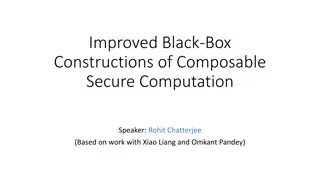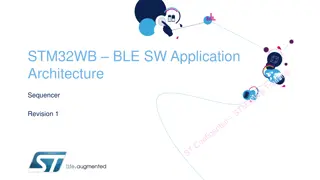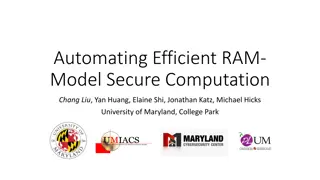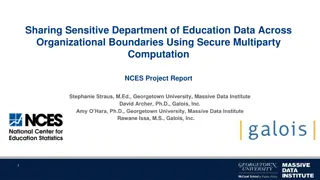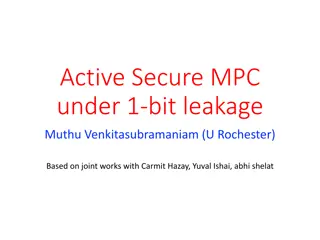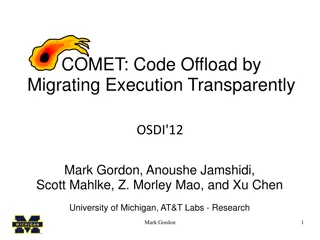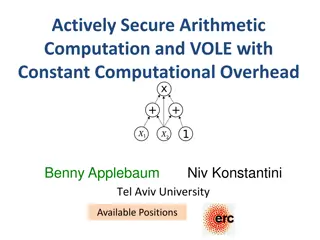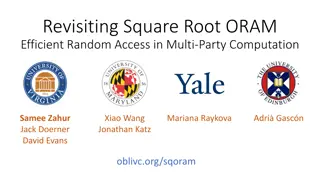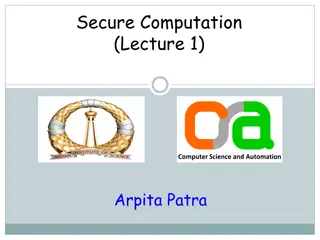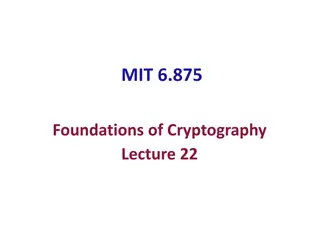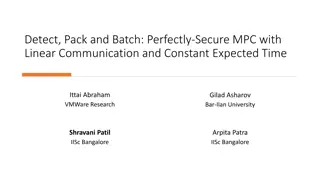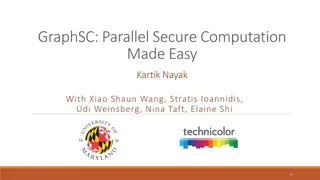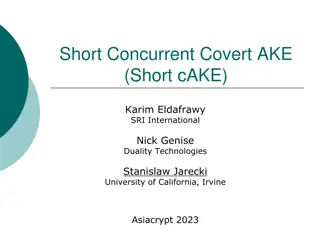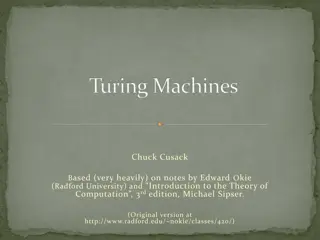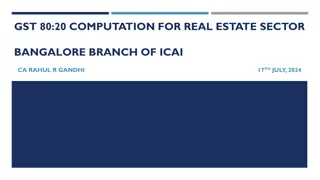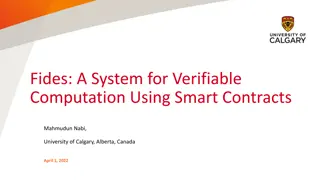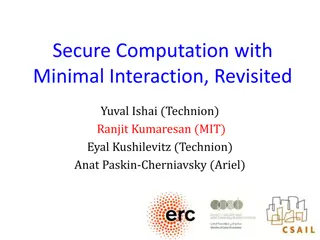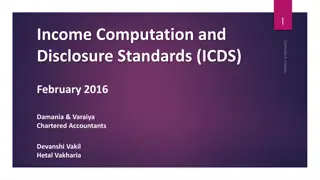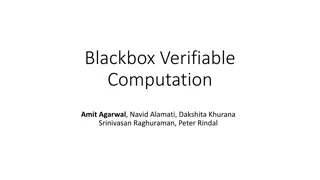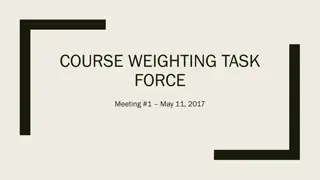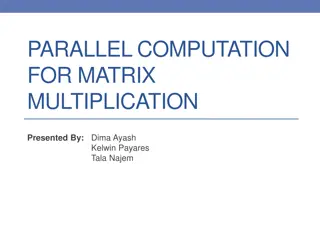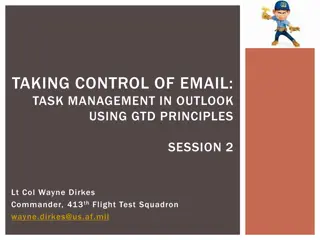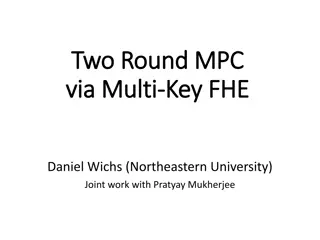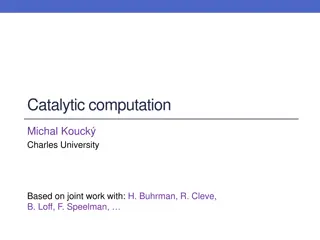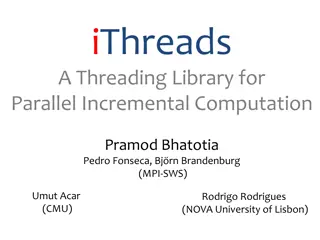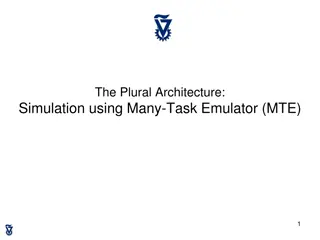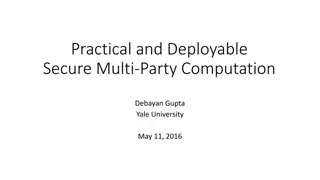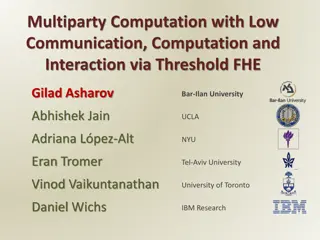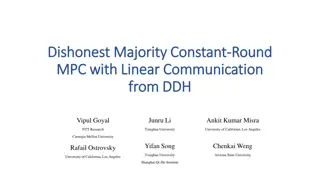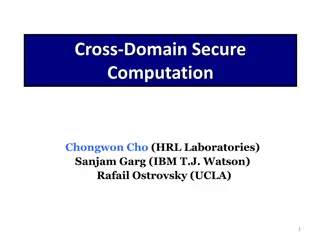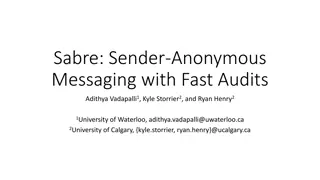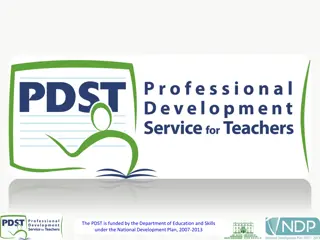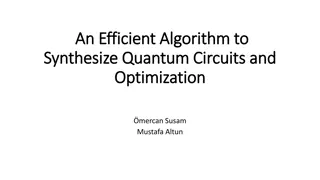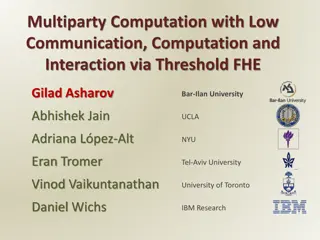Enhanced Security in Multiparty Computation
Explore the improved black-box constructions of composable secure computation, focusing on definitions, objectives, and the formalization basics of multiparty computation (MPC). Learn about the motivating security aspects in MPC and the real/ideal paradigm. Discover how MPC security involves compari
1 views • 68 slides
STM32WB BLE SW Application Sequencer Architecture Overview
The STM32WB BLE SW Application Sequencer is a specialized framework that optimizes while loop bare-metal implementations to avoid race conditions, especially in low power modes. It is not intended to compete with standard operating systems but rather with bare-metal implementations. The sequencer al
3 views • 14 slides
Secure Computation Techniques in RAM Models with Efficient Automation
Explore the automation of efficient RAM-model secure computation techniques, including examples such as secure binary search. Discover how traditional solutions using circuit abstractions can be improved for sub-linear time computation through methods like Oblivious RAM. Learn about techniques such
0 views • 37 slides
Secure Multiparty Computation for Department of Education Data Sharing
This report discusses the use of Secure Multiparty Computation (SMC) to enable sharing of sensitive Department of Education data across organizational boundaries. The application of SMC allows for joint computation while keeping individual data encrypted, ensuring privacy and security within the Nat
0 views • 15 slides
Advancements in Active Secure Multiparty Computation (MPC)
Delve into the realm of secure multiparty computation under 1-bit leakage, exploring the intersection of DP algorithms, MPC, and the utilization of leakage for enhanced performance. Discover the overhead implications of achieving active security, as well as the evolution of secure computation protoc
1 views • 43 slides
COMET: Code Offload by Migrating Execution - OSDI'12 Summary
The research paper discusses COMET, a system for transparently offloading computation from mobile devices to network resources to improve performance. It outlines the goals of COMET, its design, and evaluation, focusing on distributed shared memory and bridging computation disparity through offloadi
0 views • 31 slides
Actively Secure Arithmetic Computation and VOLE Study
Exploring actively secure arithmetic computation and VOLE with constant computational overhead at Tel Aviv University. Understanding how functions are represented in secure computation using arithmetic circuits over boolean circuits. Efficiently evaluating arithmetic circuits over large finite field
0 views • 36 slides
Enhancing Multi-Party Computation Efficiency Through ORAM Techniques
Explore the realm of efficient random access in multi-party computation through the reevaluation of classic schemes and the introduction of new approaches. Discover the potential of ORAM in improving performance and reducing costs in various computational tasks, such as secure multi-party computatio
0 views • 22 slides
Secure Computation in the Age of Information
Welcome to Secure Computation Lecture 1 by Arpita Patra. The course covers evaluation policies, projects, and references in the realm of secure computation. The content delves into the significance of information security across various sectors, emphasizing the importance of safeguarding sensitive d
0 views • 36 slides
Secure Two-Party Computation and Basic Secret-Sharing Concepts
In today's lecture of "Foundations of Cryptography," the focus is on secure two-party and multi-party computation, emphasizing semi-honest security where Alice and Bob must compute without revealing more than necessary. Concepts such as real-world vs. ideal-world scenarios, the existence of PPT simu
0 views • 27 slides
Linear Communication in Secure Multiparty Computation for Efficient and Fast Processing
The research focuses on achieving perfectly secure multiparty computation (MPC) with linear communication and constant expected time. It explores efficient approaches using a broadcast-hybrid model and P2P communication, aiming to balance speed and efficiency in MPC. The study highlights the importa
1 views • 23 slides
Secure Computation Challenges and Solutions in Data Mining
Exploring the intersection of secure computation and data mining, this content uncovers key challenges such as improving algorithms, converting programs for secure computation, and addressing parallelizability issues. It highlights the importance of cryptography in ensuring data privacy and presents
0 views • 30 slides
Covert Computation: Ensuring Undetectable Engagement
Covert computation aims to conceal the fact that computation is occurring and hide engagement in certain tasks like secure computation, authenticated key exchange, and more. By making messages indistinguishable and utilizing steganographic channels, it becomes possible to keep the activities covert
1 views • 16 slides
Overview of Task Computing in Parallel and Distributed Systems
Task computing in parallel and distributed systems involves organizing applications into a collection of tasks that can be executed in a remote environment. Tasks are individual units of code that produce output files and may require input files for execution. Middleware operations coordinate task e
1 views • 17 slides
Overview of Turing Machines: Introduction, Tape, and Computation
Turing Machines are fundamental in the theory of computation, capable of recognizing all computable languages. They consist of a Finite State Machine combined with an infinite tape. The tape is initialized with input on the left end, and a TM's computation can either halt by entering special accept
2 views • 29 slides
Computation for Real Estate Sector in Bangalore Branch of ICAI
Practical overview of GST computation for real estate transactions in Bangalore, with details on old rates with ITC and new rate regime effective from April 1, 2019. The content discusses different transactions, conditions for new rates without ITC, and provides insights on the 80:20 computation met
1 views • 39 slides
Fides: A System for Verifiable Computation Using Smart Contracts
Fides presents a system for verifiable computation using smart contracts, focusing on blockchain basics, Ethereum, smart contracts, and outsourcing computation. It explores key components of blockchain, Ethereum's decentralized computing platform, properties of smart contracts, and the concept of ve
2 views • 25 slides
Insights into Secure Computation with Minimal Interaction
This paper revisits the concept of secure computation with minimal interaction, focusing on the challenges and possibilities of achieving secure multiparty computation in 2 rounds. Specifically exploring scenarios with 3 and 4 parties, the study delves into the reasons for choosing n=3, n=4, and t=1
0 views • 23 slides
Overview of Income Computation and Disclosure Standards (ICDS)
The Income-tax Act, 1961 introduced Income Computation and Disclosure Standards (ICDS) to be followed by certain assesses for computation of income. ICDS applies to taxpayers using the mercantile system of accounting from the Assessment Year 2016-17 onwards. Non-compliance with ICDS can lead to Best
0 views • 49 slides
Blackbox Verifiable Computation Scheme Overview
This summarized content discusses the concept of blackbox verifiable computation, focusing on the challenges faced by clients and servers, the role of helper oracles, positive results utilizing homomorphic encryption, and background information on Random Self Reducible (RSR) functions. The protocol
0 views • 20 slides
Course Weighting Task Force Meeting May 11, 2017
The Course Weighting Task Force meeting held on May 11, 2017, aimed to study and potentially recommend changes to current course weighting practices within SBISD. The task force discussed members' familiarity with the system, concerns, interests, and potential impacts. The executive limitations of t
1 views • 15 slides
Parallel Computation for Matrix Multiplication
Matrix multiplication is a fundamental operation with diverse applications across scientific research. Parallel computation for matrix multiplication involves distributing the computational workload over multiple processors, improving efficiency. Different algorithms have been developed for multiply
1 views • 36 slides
Effective Task Management in Outlook Using GTD Principles
Developing efficient email and task management skills in Outlook through GTD principles. Sessions cover problem definition, zero inbox concept, MYN basics, task creation from emails, task subject context, and task start dates. Learn to create, organize, and track tasks effectively for improved produ
0 views • 20 slides
Advanced Techniques in Multi-Party Computation
Explore cutting-edge methods in Multi-Party Computation (MPC), including leveraging Fully Homomorphic Encryption (FHE) for minimal round complexity, constructing MPC directly via FHE techniques, and simplifying multi-key FHE constructions for efficient decryption. Learn about key concepts such as di
0 views • 17 slides
Catalytic computation
Catalytic computation, space hierarchy theorem, and reversible computation are explored in collaboration with researchers from Charles University. The interplay between work space, auxiliary tapes, and catalyst space is investigated to understand the power and limitations of different computational
1 views • 30 slides
Practical and Deployable Secure Multi-Party Computation
This content delves into the realm of Secure Multi-Party Computation (SMPC), exploring its practical applications, challenges, and the evolving landscape of modern cryptography. It discusses the apparent paradox of encrypted data safety and usability and touches on topics like Privacy-Preserving Pro
0 views • 35 slides
Multi-party Computation Fundamentals
Covering concepts of secure computation, from Shamir secret-sharing to advanced protocols like BGW and Yao, exploring MPC with both honest and dishonest majorities, discussing techniques for secure computation with malicious adversaries, and delving into secret sharing and VSS.
0 views • 24 slides
Fast Secure Computation for Small Population over the Internet
Efficient 3-Party and 4-Party protocols with honest majority, achieving strong security notions. Secure MultiParty Computation (MPC), joint function f(x1, x2, .., xn) with goals of correctness and privacy. Real-world applications in Secure ML, auctions, and more. Explore why small populations with h
1 views • 13 slides
iThreads: A Threading Library for Parallel Incremental Computation
This content explores iThreads, a threading library designed for efficient execution of applications in successive runs with small input changes. They aim for transparency, practicality, and efficiency in parallel incremental computation, targeting unmodified pthreads-based programs while supporting
0 views • 28 slides
Exploring Many-Task Emulator (MTE) for Simulation in Plural Architecture
Dive into the realm of Many-Task Emulator (MTE) and its application in the simulation of plural architecture. Discover the functionalities of MTE in handling multiple tasks, the setup process, task segmentation, and more. Uncover the intricacies of creating task graphs, managing various task types,
0 views • 17 slides
Practical Deployment of Secure Multi-Party Computation and Cryptography Paradox
Explore the practical aspects of Secure Multi-Party Computation (SMPC) and the paradox of modern cryptography. Discover how SMPC allows joint computation while keeping inputs private. Learn about the challenges and advancements in deploying SMPC for privacy-preserving proximity calculations.
0 views • 35 slides
Multiparty Computation Using Threshold Fully Homomorphic Encryption
Explore the concept of multiparty computation with low communication and computation complexity through threshold fully homomorphic encryption. Advantages include reduced round complexity, low communication requirements, and independence of specific functions and inputs. Discover how this approach c
0 views • 35 slides
Efficient Fully Malicious Multiparty Computation Protocol
Explore the construction of a fully malicious Multiparty Computation protocol in the dishonest majority setting, aiming for constant rounds and linear communication complexity. Delve into known literature results and communication-efficient protocols for secure computation scenarios.
0 views • 41 slides
Secure Two-Party Computation Techniques Explained
Delve into the world of secure two-party computation techniques such as Yao's Garbled Circuit (GC) and the innovative Free-XOR technique. Explore the research, challenges, and advancements in achieving practicality in secure computation protocols.
1 views • 32 slides
Secure Computation Protocols and Challenges in the Internet World
Explore the world of secure computation protocols such as cross-domain secure computation, GMW protocols, and black-box simulators, along with the challenges faced in ensuring security in the internet world. Learn about concurrent security issues and the complexities involved in constructing secure
0 views • 28 slides
Secure Messaging and Multiparty Computation Techniques
Explore Sabre anonymous messaging and secure multiparty computation protocols for enhanced data privacy and security. Learn about additive secret sharing techniques for secure data transfer and computation.
1 views • 53 slides
Practical Achievement Task Guidelines for Leaving Certificate Applied Students
This document outlines the guidelines and requirements for the Practical Achievement Task for Leaving Certificate Applied students, funded by the Department of Education and Skills under the National Development Plan. It covers the nature, purpose, and scope of the task, emphasizing its significance
0 views • 19 slides
Efficient Algorithm for Quantum Circuit Synthesis and Optimization
Explore the efficient algorithm for synthesizing quantum circuits and optimizing quantum computation. Delve into essential functions, sorting, and experimental results in quantum computation. Discover the advancements in quantum computation led by IBM, Google, and Lockheed Martin. Learn about the fu
0 views • 27 slides
Efficient Computation in CS 121 Lecture 17 - P. Madhu Sudan
Explore the concepts of efficient computation in CS 121 Lecture 17 with P. Madhu Sudan. Topics include time complexity, classes like P and EXP, Turing machines, running time definitions, circuit efficiency, and more. Dive into the world of quantitative and qualitative studies in computer science. Le
0 views • 22 slides
Multiparty Computation with Threshold Fully Homomorphic Encryption
Explore the concept of Multiparty Computation with low communication complexity and independent computation, featuring Threshold Fully Homomorphic Encryption. Learn about advantages such as low round complexity and communication complexity, as well as the implementation of Threshold Key Generation,
0 views • 35 slides
